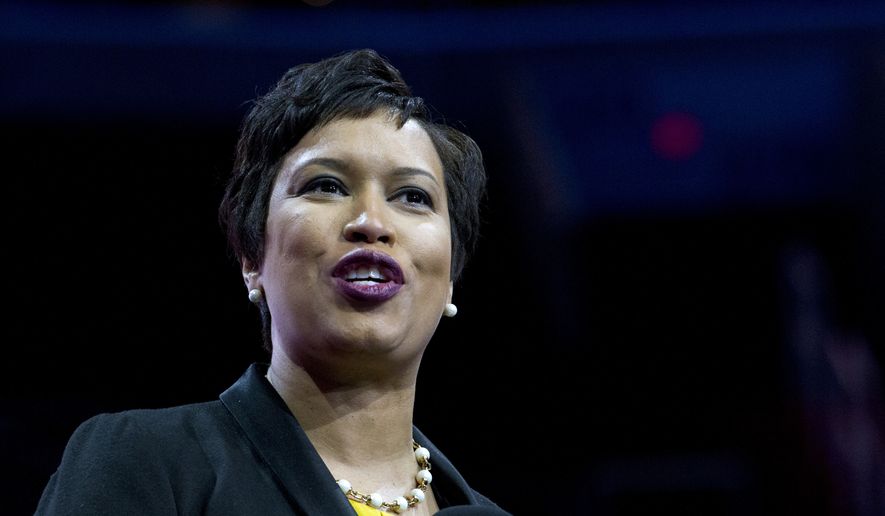D.C. Mayor Muriel Bowser pledged Tuesday to keep in place automatic tax cuts triggered by the city’s recent financial success, despite a push from progressive groups to use that money for more affordable housing.
Unveiling her $13.8 billion fiscal 2018 budget, Miss Bowser said the $100 million in tax cuts were promised and will be delivered.
“What we did was, we looked at what we needed and what we could invest in this year and in the whole financial plan and what those investments would turn into. And this is where we landed,” the Democratic mayor said, noting that city residents would benefit from more than half of the tax cuts.
City Administrator Rashad Young said at a Monday briefing that tax cuts would directly impact Washingtonians, “so the mayor thought it important that we provide those tax cuts and savings to residents.”
Those cuts, set to start Jan. 1, are part of a tax reform package the D.C. Council enacted in 2014 based on the recommendations of a panel of experts. The reductions were to be triggered only if the District’s revenues reach a certain threshold.
This round of cuts will increase personal tax exemptions and deductions for residents to meet the federal level of $4,000. Businesses will see a reduction in the city’s franchise tax from 9 percent to 8.25 percent.
The tax breaks for middle- and low-income residents will come next year, in the midst of a mayoral election. Miss Bowser has not officially announced her re-election campaign, but she is widely expected to run for a second term.
But a bevy of progressive groups, including the D.C. Fiscal Policy Institute, D.C. Action for Children, D.C. Working Families and the Fair Budget Coalition, say the money would be better spent on affordable housing, the homeless, schools and transportation.
They said with President Trump’s unpredictable budget, the city should save that money in case federal funding to D.C. programs is cut. City officials last month estimated the Trump budget, if passed by Congress, could cost the District at least $103 million in federal funds.
“The District is financially thriving, with growing revenues and one of the healthiest reserves in the nation. Yet current fiscal policies prevent new revenues from being used to meet urgent needs in favor of automatic [tax] cuts,” the group said in a letter last week to Miss Bowser.
The budget must be approved by the city council, which often changes the mayor’s spending plan, but there’s little indication there of a push to ax the tax cuts. Council member Charles Allen said lawmakers would likely keep the full tax reductions intact.
“I don’t think there is an appetite on the council to change the tax cuts,” said the Ward 6 Democrat. “That’s real money in working families’ pockets.”
In coming weeks, the council will wrestle with the details of Miss Bowser’s $13.8 billion proposal, which represents a 3.4 percent increase over last year’s budget.
About $7.6 billion come from local tax dollars and $3.3 billion from federal grants and Medicaid. The rest is allocated from enterprise funds, federal payments for local services and dedicated taxes.
Of the local operations budget, more than $2 billion will go to public education, $1.9 billion to human services and $1.1 billion to public safety.
Miss Bowser didn’t announce any large-scale, signature initiatives in her budget, but did tout a fully funded $100 million Housing Production Trust Fund and $10 million set aside for a new Housing Preservation Fund.
She pledged $11.7 million for police recruitment and retention programs, including incentives for police officers to live in the city, and $2.3 million for a “portal” to link residents to job opportunities and city services after they come home from prison.
The budget includes $20 million in capital funds to begin implementing the city’s paid family leave program — one of the most generous in the country and the only one that will be funded via a tax on businesses.
Those funds already were set aside by the council last year. Miss Bowser said she is still working with council Chairman Phil Mendelson on tweaking the program, which became law without the mayor’s signature in February.
Miss Bowser has expressed concern over the massive program, which will require a new agency to oversee the benefits, which likely won’t go into effect until 2020. The $20 million in the budget would go to designing an administrative system and standing up the new agency.
• Ryan M. McDermott can be reached at rmcdermott@washingtontimes.com.




Please read our comment policy before commenting.